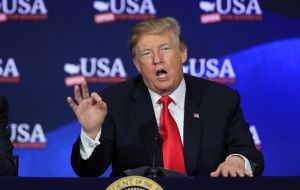MercoPress. South Atlantic News Agency
Despite Trump, Europe, Russia and China committed to the Iran nuclear deal
 UK, France and Germany say they “will work with all remaining parties” and urged the US not to obstruct its implementation of the Iran nuclear deal
UK, France and Germany say they “will work with all remaining parties” and urged the US not to obstruct its implementation of the Iran nuclear deal  Iranian President Hassan Rouhani said: “I have ordered the foreign ministry to negotiate with the European countries, China and Russia in the coming weeks”.
Iranian President Hassan Rouhani said: “I have ordered the foreign ministry to negotiate with the European countries, China and Russia in the coming weeks”.  In a televised address Trump informed the US would withdraw from the JCPOA, describing it as a “horrible, one-sided deal that should have never, ever been made”
In a televised address Trump informed the US would withdraw from the JCPOA, describing it as a “horrible, one-sided deal that should have never, ever been made” Western powers, Russia and China remain committed to the Iran nuclear deal - after the US announced it was withdrawing from the agreement. The UK, France and Germany say they “will work with all remaining parties” and urged the US not to obstruct its implementation and the other signatories to the 2015 deal - Russia and China - have also stressed their continuing support.
Iran says it is working to salvage the deal without US involvement.
“Our governments remain committed to ensuring the agreement is upheld, and will work with all the remaining parties to the deal to ensure this remains the case,” the UK, France and Germany said in a joint statement.
On Tuesday, Iranian President Hassan Rouhani said: “I have ordered the foreign ministry to negotiate with the European countries, China and Russia in the coming weeks.
”If we achieve the deal's goals in co-operation with other members of the deal, it will remain in place.”
The so-called Joint Comprehensive Plan of Action (JCPOA) curbed Iran's nuclear activities in return for the lifting of sanctions that had been imposed by the UN, US and EU
In a televised address on Tuesday, President Donald Trump said the US would withdraw from the JCPOA. He called it a “horrible, one-sided deal that should have never, ever been made”.
Rather than protecting the US and its allies, he said it had placed “very weak limits on the regime's nuclear activity and no limits at all on its other malign behavior, including its sinister activities in Syria, Yemen and other places.”
The president added that the accord did not deal with Iran's development of ballistic missiles, and that its inspections mechanisms were not strong enough. He said he would re-impose economic sanctions that were waived when the deal was signed in 2015.
The US Treasury said economic sanctions would not be re-imposed on Iran immediately, but would be subject to 90-day and 180-day wind-down periods.
In a statement on its website, it said the sanctions would target industries mentioned in the deal, including Iran's oil sector, aircraft exports, precious metals trade, and Iranian government attempts to buy US dollar banknotes.
US National Security Adviser John Bolton is reported as saying that European companies doing business with Iran will have to finish within six months or face US sanctions.
The Russian foreign ministry said it was “deeply disappointed” by Mr Trump's decision. Japan said it would closely monitor the impact of the US withdrawal.
The European Union's top diplomat, Federica Mogherini, said the EU was “determined to preserve” the agreement.
A spokesman for UN Secretary General Antonio Guterres said he was “deeply concerned” at the announcement and called on the other signatories to abide by their commitments.
But Israel's Prime Minister Benjamin Netanyahu says he “fully supports” Mr Trump's “bold” withdrawal from a “disastrous” deal. And Saudi Arabia, Iran's regional rival, says it “supports and welcomes” Mr Trump's moves towards pulling out of the accord.
The JCPOA saw Iran agree to limit the size of its stockpile of enriched uranium - which is used to make reactor fuel, but also nuclear weapons - for 15 years and the number of centrifuges installed to enrich uranium for 10 years.
Iran also agreed to modify a heavy water facility so it could not produce plutonium suitable for a bomb. In return, sanctions imposed by the UN, US and EU that had crippled Iran's economy were lifted.




Top Comments
Disclaimer & comment rulesCommenting for this story is now closed.
If you have a Facebook account, become a fan and comment on our Facebook Page!